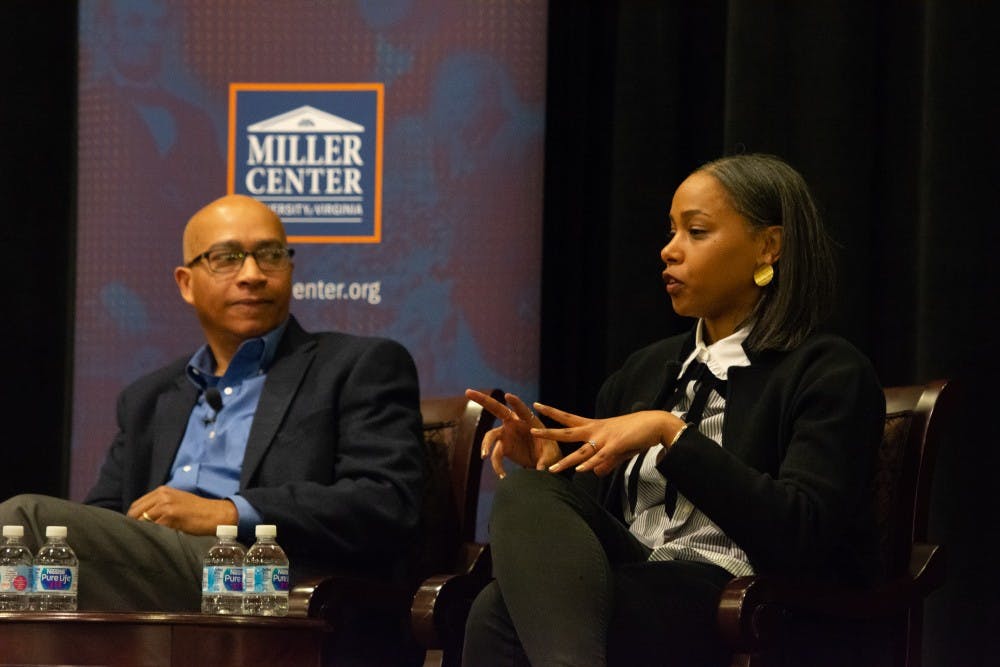As part of the University’s 2019 Community MLK Celebration, the University’s Miller Center of Public Affairs hosted a panel Tuesday afternoon in Newcomb Theater entitled “Race in the Decade since Obama,” which focused on how race relations in United States have changed in the ten years since Obama took office. Melody Barnes — an assistant to the president and director of the White House Domestic Policy Council during the Obama administration — moderated the event. The New York Times’ Lauretta Charlton and Kevin Gaines, Julian Bond prof. of Civil Rights and Social Justice, served as panelists.
Over 200 people were in attendance, most of them being Charlottesville community members. The first half of the program was spent with Barnes, Charlton and Gaines engaging in moderated discussion, with an audience-driven question-and-answer session characterizing the second half.
Barnes, who currently serves as the director of the University’s Democracy Initiative, started the conversation by tackling the broader topic of addressing white supremacy in America — a topic of particular relevance to Charlottesville in the aftermath of the white supremacist rallies of August 2017. Charlton spoke about how America has only recently initiated conversations around the issue.
“Things like white privilege, things like white supremacy, things like microaggressions, we are just starting to address them in ways that are available to the average person,” Charlton said.
To Gaines, it is important to discuss these important race issues — especially in the classroom — rather than pretending to be “colorblind.”
“I’m in that select category of people that enjoys talking about race,” Gaines said. “White supremacy, I try to tell my students, is a bundle of ideas, narratives and stories that have been at the center of a politics and culture.”
Barnes then moved to discuss how Obama’s presidency and how feelings regarding race have changed since Obama first entered the Oval Office. Barnes described the ability to vote for an African-American president as “a moment of hope and a moment of opportunity for so many in the United States.”
“It’s been 10 years since the first African-American president was inaugurated, and yet we still find it difficult to even talk about race and issues that stem from that,” Barnes said.
Much of the panel’s conversation was centered around how many Americans hoped that the election of an African-American president would lead to a “post-racial America,” which refers to a United States that is free from discrimination and prejudice.
Charlton did not subscribe to this belief, instead wanting the country to take the time to work through its history and anguish and not simply move past it.
“There was a sense that it was over, and America’s racial sins had been accounted for,” said Charlton. “And I was very frustrated [by it], actually.”
Gaines disagreed with this idea of a “post-racial America” as well, claiming that the term is just a synonym for “colorblind” and a way to shut down the conversation of racism rather than solve the issues it brings about.
“The goal is not so much a post-racial society,” Gaines said. “The goal is having sort of an honest historical reckoning of our shared history of race and racism, slavery and segregation … so that we can get to a point when we can acknowledge that shared history and acknowledge the power and the political residence of the terms black and white without denying their existence.”
All three of the speakers ultimately agreed that although Obama’s election was a monumental moment in American history, there is still more work that needs to be done in the area of race relations in America. The panel’s discussion consisted of conversations that the speakers believed everyone should be taking part in — especially at the University — to solve issues of racism rather than push them down.
“Universities are really magical places where people from different walks of life, different communities, can actually interact and communicate and learn about each other,” Gaines said.
First-year College student Reva Joshi attended the event in order to hear “what some experts in certain fields think of how politics and race relations have changed.” She thought the panel taught her more about the importance of Obama’s presidency, both to him and to African Americans.
“I think [the panelists] covered the topic that [the Miller Center] advertised fairly well, but I would have liked to hear a little more about how they think race relations have changed in the last 10 years,” said Joshi. “I felt as though they intentionally left out talking about the Trump presidency or current racial issues for the sake of not dragging current politics into the discussion, or maybe to not offend anyone, but I think it’s hard to talk about how race relations have changed without being up front about what’s happening right now.”





